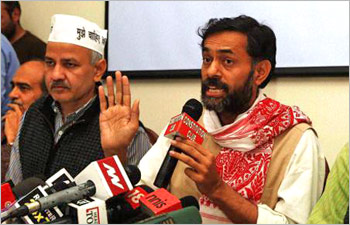New Delhi, Mar 1: Aam Aadmi Party (AAP) founding members Prashant Bhushan and Yogendra Yadav are likely to either resign from the party or assume non-active roles, sources said.

A day after media reports stated that the party was looking at reconstituting the Parliamentary Affairs Committee (PAC) and keeping Yadav out of it, both party members expressed a desire to leave. AAP’s national convener Arvind Kejriwal did not dissuade them, sources said.
A meeting of AAP’s national executive was held on Thursday, which Kejriwal did not attend. According to party members, an argument between Yadav and other party members broke out. Another meeting was held on Friday which Yadav and Bhushan did not attend. It was in this meeting that the members asked Kejriwal to remain the national convener and reconstitute the PAC.
The differences between Kejriwal and Bhushan and Yadav have been out in the open for quite some time now. While Yadav tried to quit the PAC after the AAP’s Lok Sabha elections debacle, Bhushan had differences with Kejriwal over candidate selection.
In a letter written to Kejriwal in June, which was leaked to the media, Yadav had flayed Kejriwal’s dictatorial attitude. The party and Kejriwal had convinced Yadav to stay on at that time.
Bhushan, on the other hand, has been angry with the party’s choice of candidates for assembly elections as well as the way the party has been functioning for many months now. His father, Shanti Bhushan, who had given Rs 1 crore to the party when it was set up, had said a few days before the Delhi election that Kejriwal should quit as the party’s national convener.
The AAP party leadership, however, doesn’t seem too keen to ask Bhushan to stay back. In Yadav’s case, the party might accept his resignation from the PAC but may ask him to remain a part of the party.
According to party insiders, Yadav had a big role to play in scripting the party’s rural Delhi victory. AAP won all 12 rural seats this year, up from 0 in 2013.
Yadav and Kejriwal were also seen differing on the party’s future after the Delhi elections. While Yadav said that the party would expand to four other states, Kejriwal said AAP would concentrate all its efforts on Delhi.
Contacted, Yadav, however, said that no decision on any reconstitution within the party had taken place.
“Changing the division of responsibility is a constant process in any party. We have to be ready to give the party at least 20 years of our lives. I have fulfilled whatever responsibility the party has given to me in the past and will continue to do so even now. The organisation is bigger than any individual,” said Yadav.me






Comments
Add new comment